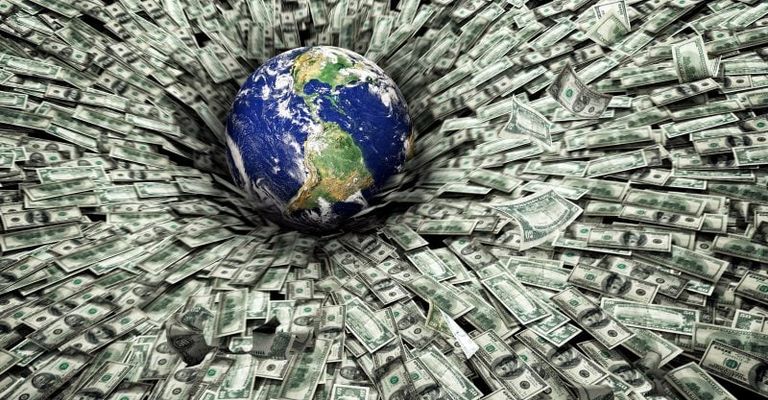
Apart from the growth in debt, what makes the situation even worse is the increase in the cost of financing in southern countries, such as Spain, whose cost of financing (known as the risk premium) has not stopped rising, as shown in the following graph:
We can see the catastrophic evolution of the interest payable on our 10-year bond, which now has to pay interest of around 7.3%, which is, of course, unsustainable.
On the other hand, we can see the opposite trend of the German 10-year bond.
It can be seen that its trend is completely opposite to the Spanish bond, and the interest payable on 20-7-12 for this bond is 1.17%, that is, a historic low and that value, as can be easily deduced, is well below inflation; that is, there are a large number of investors who are giving their money to Germany for 10 years, with a negative real interest rate, proof of the fear that currently exists in the business world, due to global uncertainties.
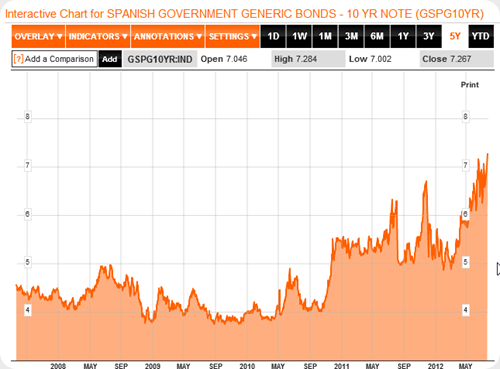
One of the main causes of this cheapening of financing for German bonds is due to the huge capital flight that is taking place from the "peripheral" countries with problems, towards Germany, which is making the cost of financing for our countries brutally more expensive, while financing for Germany and the rest of the "core" of the Euro is also brutally cheaper.
If Germany had a different mentality in this process, if it really wanted to help the countries of the South, what it should do is allocate a good part of the money from transfers from the wealthy people of the South , who have taken their capital because of the total lack of confidence in the institutions of their own countries, to Germany; and that part of the money that comes from wealthy individuals in the South be allocated, I say, and lent to the governments of the South at a somewhat higher interest rate, let's say, 3%, that is, Germany, in this process, would earn almost 2% without having to touch the savings of its citizens, and in this way the countries of the South could be financed more economically, in fact using the money of the wealthy citizens themselves, because the ease of financial transfers generates these instabilities in the whole and it is time for Europe to stop them.
My previous proposal is a "short-term" one, in order to continue making the administrations of countries work, but I believe that in the medium term there is no other way out (which will not, of course, be painless) than to cancel a very important part of the debts (written-down) and tackle once and for all the regulation of the financial system and tax havens, in a concerted manner by all countries (at least those of the OECD); and then address the problem of trade imbalances and the general productive and redistributive structure of society.
Obviously, debt cancellation must be accompanied by a structural process in two directions:
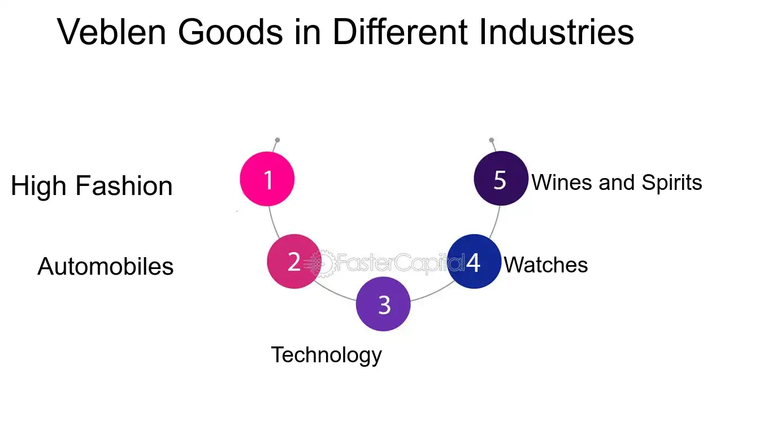
a) Limiting the waste of the administrations (EREs to those estimated at 450,000 politicians, elimination of official cars, elimination of regional and local televisions, elimination of absurd public companies, reduction of the general number of civil servants in management functions, elimination of associations, reduction of employees in town halls that have exploded with the bubble, exhaustive cost/benefit analysis of public works, etc...). If we do not reduce the general cost of the administration, we will continue to need huge amounts of external money from someone who will end up dictating their conditions and the country will end up impoverished.
b) Changing the production model and necessarily bringing about an industrial and agricultural recovery, by means of a re-localisation of production, which will necessarily involve a control of market access for products from outside the Monetary Union (tariffs). Is it normal that Spain, with its immense agricultural wealth, imports agricultural products from the other side of the world, such as pears from Chile, asparagus from China, fish from Vietnam, etc.? This must be done throughout the Union, and I am very afraid that Germany will not be willing to do so.
I say that Germany is not in favour of controlling the European market because Germany, along with China, have been the great beneficiaries of globalisation; China because it takes advantage of the fact that it is an immense reserve of cheap labour, and Germany because it sells a large quantity of "prestige" or Veblen goods (named after the American economist Thorstein Veblen ), so in the following diagrams you can see the difference between "normal" goods and Veblen goods:
In the case of Veblen goods, demand (Q) rises as price (P) rises, unlike "normal" goods, whose demand falls as price rises.
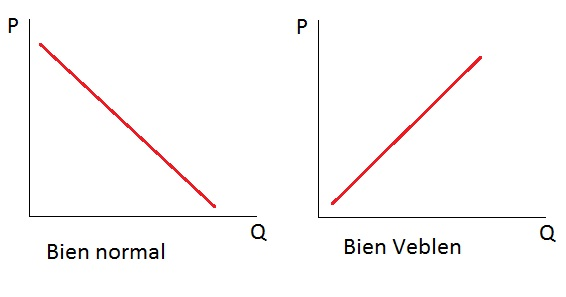
Germany sells BMWs, Mercedes, Audis, Porsches, products whose high demand is due to their high price, since they are the "universal" symbol of success, therefore, the dream of any new wealthy Chinese, Brazilian, Indian, Russian or any other country, is to have enough money to buy one of those brand new and expensive German cars, made, of course, in Germany, because a Porsche "Made in China", of course... And these products can pay high salaries to the workers who make them without fear of strong competition, since that brand prestige is not "made" in 2 days, since they have been at the top of the luxury car market for 100 years now.
Given all that has been described above, perhaps Spain should seriously consider leaving the Monetary Union, under penalty of becoming the "pariahs" of the Continent, with a depressed standard of living and subject to the "diktat" of the German "owners."
Well, I think that the collaboration between countries that I describe in the paragraphs above is not going to happen, because it must be part of the actions of the "privileged" in the current dynamics of society, and our politicians are part of it, and it is like having asked, in the years prior to 1914, that the rulers of the different countries had limited their commercial and territorial ambitions, their arms policy, the formation of antagonistic blocks, the desire for revenge, etc. ... which ended in the disaster of the "guns of August" (of 1914), with its millions of dead and after which, the world was never the same again.
Today, I believe, we sense that we are on the threshold of global changes that no one could have imagined just 5 years ago, and as the Chinese curse says: "May you live in interesting times!", the globalizing financial-speculative oligarchic framework and its mercantile "child" are running out of steam, and have reached their final phase with the destruction of any trace of democratic structure in countries and have embarked on a global-scale plundering of the resources of States that will not, cannot, be sustainable, neither by its own internal dynamics ("animal spirit") nor emotionally by the citizens who are suffering it, and it will be the responsibility of the rulers to try to change this dynamic or else face the return of the "old ghosts".

Aparte del crecimiento del endeudamiento, lo que agrava la situación aún más es el encarecimiento de su financiación en los países del Sur, como el caso de España, cuyo coste de financiación (lo que se conoce como prima de riesgo) no ha dejado de subir, y como muestra el siguiente gráfico:
Puede verse la evolución catastrófica de los intereses a pagar por nuestro bono a 10 años, que ahora tiene que pagar unos intereses del orden del 7,3% que son, desde luego, insostenibles
Por otro lado podemos ver la tendencia contraria del bono alemán a 10 años
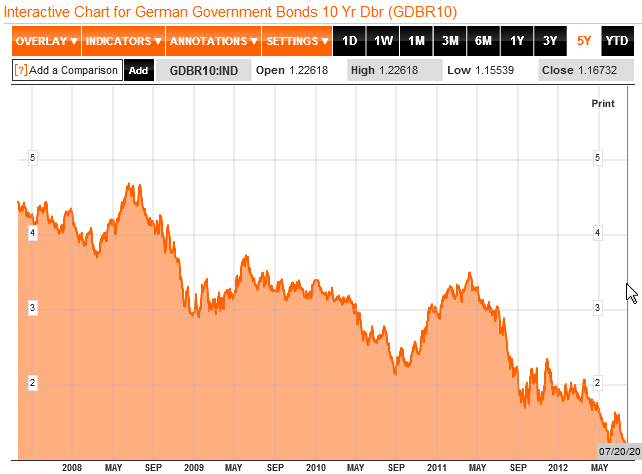
Puede verse que su tendencia es completamente la opuesta al bono español, y los intereses a pagar el 20-7-12 por este bono son de 1,17%, es decir, un mínimo histórico y ese valor, como es fácil deducir, está muy por debajo de la inflación; es decir, hay una gran cantidad de inversores que están dando su dinero a Alemania durante 10 años, con un tipo de interés real negativo, prueba del miedo que existe en la actualidad en el mundo de los negocios, por las incertidumbres globales.
Una de la causas principales de ese abaratamiento de la financiación de los bonos alemanes, es debido a la inmensa fuga de capitales que está habiendo de los países de la "periferia" con problemas, hacia Alemania, que hace que se encarezca brutalmente el coste de financiación a nuestros países, mientras se abarata, también brutalmente, la financiación de Alemania y del resto del "núcleo" del Euro.
Si Alemania tuviera otra mentalidad en este proceso, si quisiera, de verdad, ayudar a los países del Sur, lo que debería hacer es destinar una buena parte del dinero procedente de las transferencias desde los adinerados del Sur, que se han llevado su capital por la total falta de confianza en las instituciones de sus propios países hacia Alemania; y que se destine, digo, esa parte del dinero que proviene de individuos acaudalados del Sur, y se preste a los gobiernos del Sur a un tipo de interés algo mayor, digamos, el 3%, es decir, Alemania, en este proceso, ganaría casi un 2% sin tener que tocar el ahorro de sus ciudadanos, y de ésta forma se podrían financiar de forma más económica los países del Sur, en realidad usando el dinero de los propios ciudadanos acaudalados, pues la facilidad de las transferencias financieras generan estas inestabilidades en el conjunto y es hora de que Europa las ataje
Mi propuesta anterior es una "a corto", para poder seguir haciendo que funcionen las administraciones de los países, pero creo que a medio plazo no hay otra salida (que no será, por supuesto indolora) que cancelar una parte muy importante de las deudas (written-down) y atajar de una vez por todas la regulación del sistema financiero y los paraísos fiscales, de manera concertada por todos los países (al menos los de la OCDE); y a continuación abordar la problemática de los desequilibrios comerciales y de la estructura productiva y redistributiva general de la sociedad.
Evidentemente la cancelación de las deudas debe ir acompañada de un proceso estructural en 2 sentidos:
a) Limitación de los despilfarros de las administraciones (ERE a los que se estiman son 450.000 políticos, fuera coches oficiales, fuera televisiones autonómicas y locales, fuera empresas públicas absurdas, disminución del número general de funcionarios en funciones de gestión, eliminación de mancomunidades, disminución de empleados en ayuntamientos que se han disparado con la burbuja, exhaustivo análisis coste/beneficio de las obras públicas, etc...). Si no bajamos el coste general de la administración, seguiremos necesitando inmensas cantidades de dinero externo de alguien que acabará dictando sus condiciones y el país acabará empobreciéndose.
b) Cambiar el modelo productivo y necesariamente debe darse una recuperación industrial y agrícola, por medio de una re-localización de la producción, lo cual deberá pasar, necesariamente, por un control del acceso al mercado de los productos de fuera de la Unión Monetaria (aranceles). ¿Es normal que España, con su inmensa riqueza agrícola importe productos agrícolas del otro extremo del mundo, como peras de Chile, espárragos de China, pescado de Vietnam, etc...? Esto debe hacerse en el conjunto de la Unión, y mucho me temo que Alemania no estará por la labor.
Digo que Alemania no está por la labor del control del mercado europeo porque Alemania, junto con China, han sido los grandes beneficiarios de la globalización; China porque aprovecha el hecho de ser una inmensa reserva de mano de obra barata, y Alemania porque vende una gran cantidad de bienes "de prestigio" o de Veblen (nombre en honor del economista americano Thorstein Veblen), así en los siguientes esquemas puede verse la diferencia entre los vienes "normales" y los de Veblen:
En el caso de los bienes de Veblen, la demanda (Q) sube a medida que aumenta el precio (P), al contrario que los bienes "normales", cuya demanda baja al subir el precio
Alemania vende BMW's, Mercedes, Audi's, Porsche, productos cuya gran demanda se da en virtud de su alto precio, ya que son el símbolo "universal" del éxito, por ello, el sueño de cualquier nuevo adinerado chino, brasileño, indio, ruso o de cualquier otro país, es tener suficiente dinero para comprarse uno de esos flamantes y caros coches alemanes, hechos, por supuesto, en Alemania, pues un Porsche "Made in China", como que no....Y estos productos pueden pagar sueldos altos a los trabajadores que los fabrican y sin miedo a una gran competencia, ya que ese prestigio de marca, no se "hace" en 2 días, pues llevan 100 años ya en la cumbre de los coches de lujo.
Dado todo lo descrito anteriormente, quizás España deba considerar seriamente abandonar la Unión Monetaria, so pena de convertirnos en los "parias" del Continente, con un nivel de vida hundido y sometido al "diktat" de los "dueños" alemanes
Bueno creo que la colaboración entre países que describo en los párrafos de más arriba no se va a dar, pues debe formar parte de las actuaciones de los "privilegiados" en la dinámica actual de la sociedad, y nuestros políticos forman parte de ella, y es como haber pedido, en los años previos a 1914, que los gobernantes de los diferentes países hubiesen limitado sus ambiciones comerciales y territoriales, su política armamentística, la formación de bloques antagónicos, el deseo de revancha, etc...que acabaron en el desastre de los "cañones de agosto" (de 1914), con sus millones de muertos y tras el cual, el mundo ya no volvió a ser el mismo.
En la actualidad, creo, se presiente que estamos en las puertas de cambios a nivel global que nadie podía imaginar sólo 5 años atrás, y como reza esa maldición china: "¡ojalá te toque vivir en tiempos interesantes!", pues el entramado oligárquico globalizador financiero-especulativo y su "hijo" mercantil, están agotando su fuelle, y ha llegado a su fase última con la destrucción de cualquier rastro de estructura democrática de los países y se ha embarcado a un saqueo a escala global de los recursos de los Estados que no será, no puede, ser sostenible, ni por su propia dinámica interna ("animal spirit") ni emocionalmente por los ciudadanos que la están sufriendo, y será responsabilidad de los gobernantes tratar de cambiar esta dinámica o bien enfrentarse a la vuelta de los "viejos fantasmas"


El presente artículo puede haber sido publicado parcial o totalmente en algunos de mis blogs.
This article may have been published in part or in full on one of my blogs.
Mis Blogs y Sitios Web / My Blogs & Websites:
- La Cucina di Susana.
- Cucinando con Susana
- El Mundo de los Postres
- Crónicas de Un Mundo en Conflicto.
